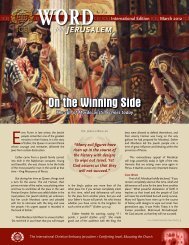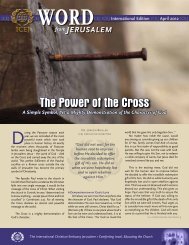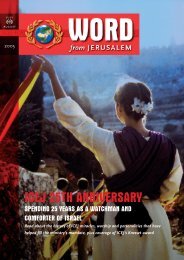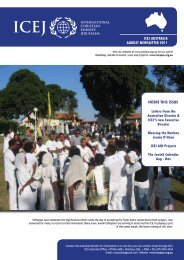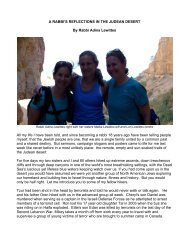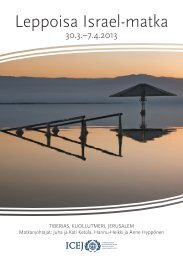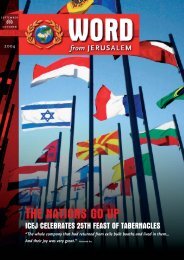WORD JERUSALEM
Mar/Apr 2004 - International Christian Embassy Jerusalem
Mar/Apr 2004 - International Christian Embassy Jerusalem
You also want an ePaper? Increase the reach of your titles
YUMPU automatically turns print PDFs into web optimized ePapers that Google loves.
The Decaying<br />
‘International<br />
Norm’<br />
by David Parsons<br />
ORDINARILY, YOU WOULD think the wrong guys<br />
got arrested.<br />
Instead of sitting in judgement over the<br />
malignancy of Palestinian suicide terrorism,<br />
the International Court of Justice in<br />
The Hague opened hearings recently on<br />
the legality of a fence Israel is erecting to<br />
protect the lives of its besieged citizens.<br />
The case arose last December when the<br />
Palestinians narrowly pushed through the<br />
United Nations General Assembly a resolution<br />
asking the world court for an advisory<br />
opinion on the “legal consequences” of<br />
Israel’s construction of a security barrier in<br />
Judea/Samaria.<br />
A sharp division of opinion has since<br />
emerged between Western democracies<br />
that fear the case will “politicise” the court<br />
and Arab/Islamic regimes that want the tribunal<br />
to declare the fence – and indeed<br />
Israel’s entire presence in the disputed territories<br />
– illegal under the Geneva conventions<br />
on warfare.<br />
Israel contends the court lacks jurisdiction<br />
in the case, since the UN Charter (in<br />
Article 12) bars the General Assembly from<br />
taking up a matter already under consideration<br />
in the Security Council. Further, UN<br />
Security Council resolution 242 is still<br />
operative in its explicit call for resort to<br />
negotiations – not litigation – to resolve the<br />
Arab-Israeli conflict.<br />
Regardless of how the court eventually<br />
rules, the proceedings already mark a low<br />
point for the international community and<br />
a dangerous milestone in the Palestinian<br />
campaign to de-legitimise the Jewish<br />
State.<br />
SPRINGING THE TRAP: The Palestinians<br />
have long dreamed and schemed of this<br />
moment, when they could haul Israel into<br />
the world court to legally enshrine its pariah<br />
status. Such was the fate of South<br />
Africa’s apartheid regime in the “Namibia<br />
case” 30 years ago and the PLO has eyed<br />
that precedent ever since.<br />
The principal Palestinian claim is that<br />
the fence violates the 1949 Geneva<br />
Convention on protecting civilians in times<br />
of war – ironically a treaty enacted to outlaw<br />
specific atrocities committed against<br />
Jews in Nazi-occupied Europe during World<br />
War II. This convention requires that civilians<br />
under foreign occupation be treated<br />
humanely and that private property not be<br />
confiscated unnecessarily.<br />
Israel contends that the Geneva conventions<br />
are not binding in the “disputed territories”,<br />
since these areas were never widely<br />
recognised as belonging to any other<br />
nation. Nonetheless, Israel has voluntarily<br />
applied its humanitarian provisions to the<br />
local Arab population. For example, a compensation<br />
process has been established<br />
for Palestinians who have lost access to<br />
farmland due to the fence.<br />
Even so, Israel anticipates a court ruling<br />
against the fence that, while non-binding,<br />
will seriously alter the contours of the dispute<br />
with the Palestinians.<br />
In one fell swoop, the Court could<br />
declare the Geneva Conventions fully binding<br />
in the territories, potentially rendering<br />
numerous Israeli actions there illegal, while<br />
also fixing the 1949 armistice lines (the<br />
“Green Line”) as the de jure border of<br />
Israel. These would be huge propaganda<br />
coups for the Palestinians and entice them<br />
to seek the Court’s judgment on every<br />
other matter of contention with Israel.<br />
Such rulings would harden Arab positions<br />
and hamper genuine peace efforts for years<br />
to come. If the territories are indeed<br />
declared “occupied” Palestinian domain,<br />
Middle East Digest<br />
Viewpoint<br />
Israel is stripped of the main currency it<br />
needs (land) to exchange for Palestinian<br />
relinquishment of the “right of return”. Thus<br />
the one grand trade-off that many think<br />
might actually resolve the conflict falls by<br />
the wayside.<br />
SINGLED OUT: On the merits, Israel<br />
insists the fence is a temporary and legitimate<br />
act of self-defence against suicide<br />
terrorists. Article 27 of the Geneva conventions<br />
would expressly give Israel the right<br />
to use such “control and security” measures<br />
as may be “necessary as a result of<br />
the war”.<br />
Certainly, raising fences and walls for<br />
self-preservation is one of the oldest<br />
and most universally accepted instincts<br />
of man. For proof, one needs to look no<br />
further than the ancient walls that<br />
today grace central Jerusalem and<br />
Damascus.<br />
At present, the US-led coalition in Iraq<br />
is building security barricades in<br />
Baghdad and elsewhere, just as India has<br />
completed a security fence in “disputed”<br />
Kashmir to keep out Pakistani terrorists.<br />
Even Saudi Arabia began erecting a fence<br />
in the disputed border area with Yemen to<br />
block terrorist infiltrators, while the UN<br />
itself maintains a fence that splits Cyprus<br />
in two.<br />
Yet for some reason, only Israel’s security<br />
barrier is the subject of an urgent, UNmandated<br />
judicial inquiry. Once again,<br />
there seems to be one set of laws for the<br />
Jewish State and another for the rest of the<br />
world. Meanwhile, Israelis are targeted<br />
daily by a jihad terrorism that the UN refuses<br />
to condemn for what it truly is – “crimes<br />
against humanity”.<br />
Sadly, such anti-Semitic double standards<br />
have now become the “international<br />
norm”; or, as the Palestinians like to call it,<br />
“the resolutions of international legitimacy”.<br />
How did this moral rot ever get mistaken<br />
for justice?<br />
■<br />
- 17 -



